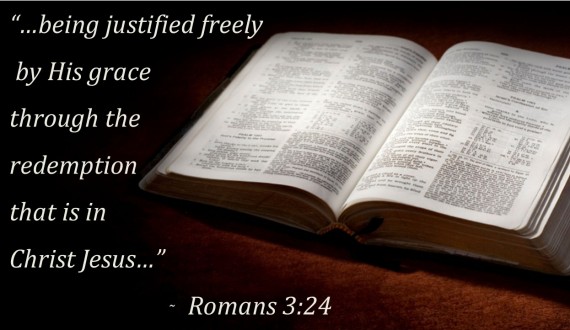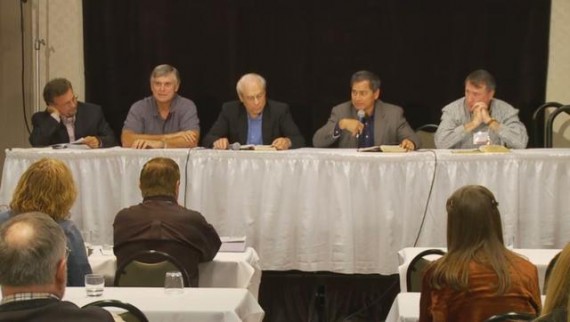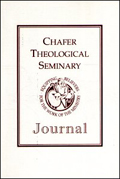
I am on a panel discussion tomorrow night at the National Conference of the Free Grace Alliance. The panel discussion is related to the death and resurrection of Jesus, and whether a person needs to know and believe these historical facts in order to be born again. My invitation to this discussion is due to the so-called Crossless Gospel controversy. People accuse me of teaching a Crossless Gospel, which is exceedingly strange, since I believe the cross is at the very center of the gospel. Without the cross, there is no Gospel.
Anyway, here are some of the issues to be addressed in this Free Grace Alliance panel discussion.
Is Belief in the Death and Resurrection Necessary?
I am presenting the view that while the death and resurrection of Jesus was necessary for justification to be possible, belief in the death and resurrection of Jesus is not what grants a person eternal life. A person simply needs to believe in Jesus for eternal life to be given it by God. I have written on this in the past. Certainly, the death and resurrection of Jesus are central to the Gospel, but since there is so much Biblical information that is part of the Gospel, one does not have to believe the entire Gospel to be justified.
There is a difference between the mechanism of justification (the death and resurrection of Jesus, along with a myriad of other things) and the message of eternal life (believe in Jesus for it). In other words, there is a difference between the Gospel information, and the Gospel invitation.
I agreed to be on this panel for three reasons.
Clarity in Evangelism
First, I want people to be clear in evangelism. If we have a muddled evangelistic message, all we do is erect barriers which keep people from believing in Jesus for eternal life. The death and resurrection of Jesus are definitely part of what we share in evangelism, but we tell them these things to convince and persuade them to believe in Jesus for eternal life, not because they get eternal life by believing in the death and resurrection of Jesus. It’s a nuance, but a very important one. After all, there are many who believe in the death and resurrection of Jesus, but don’t believe in Him for eternal life.
Hear from the Horse’s Mouth
Second, I know there are a lot of people who are trying to understand the various positions on the Gospel, and there are many people accusing me of believing things I don’t believe.
So I hope to let them hear my position from me rather than from those out there who don’t understand my position but continue to write pejorative and negative things about me. It’s always best when researching a matter to go to the source.
To Understand the Other Views
Third, I see no logical or Biblical consistency in the view of those who are taking the opposing view. Clearly, they think their view is logical and Biblical or they wouldn’t hold it. I am not exactly trying to persuade them to my view, but I do want to try to understand their view. Toward that end, here are the questions I hope to have answered:
- If a person must believe in the death of resurrection of Jesus, is it sufficient to believe in the historical facts of these events, or does a person also have to believe in substitutionary atonement?
- If a person does have to believe in substitutionary atonement, what if that person holds the ransom to Satan view?
- If a person must believe in the death and resurrection of Jesus, do they have to believe that it was by the shedding of blood of Jesus on the cross that sins are forgiven, or can they just believe that it was simply His death that was sufficient? In other words, does a person have to understand that their sins are forgiven “by His blood” and not just by His death?
- If a person must believe in the death and resurrection of Jesus, must they believe that Jesus rose in a glorified, eternal, incorruptible body, and that He went on to ascend into heaven, or can they believe that He went on to live, grow old, and die again of old age like the others who were resurrected in Scripture?
- If a person must believe in the death and resurrection of Jesus, must they believe that the resurrection is a past, historical event, or can they believe that Jesus will rise from the dead in the future?
- If a person must believe in the death and resurrection of Jesus, what was the object of faith for OT people and the apostles who did not (as far as we can tell) believe in the death and resurrection of Jesus? Did the object and content of faith change after the death and resurrection of Jesus?
- What passages are there in Scripture which teach that a person must believe in the death and resurrection of Jesus in order to receive everlasting life?
- If a person believes that Jesus died on the cross for their sins, and rose again from the dead, but don’t believe that by faith in Jesus they have life that can never be lost, are they justified? (E.g., They say things like “Jesus did his 99%, but I must do my 1%” or “I’m saved now, but if I sin later, I won’t be saved any more” or “I accepted the gift of eternal life, but I can give it back if I don’t abide.”)

In all of my study of the other view, I have yet to read an attempt to answer these questions. Others have noticed this same thing, and we receive daily e-mails and phone calls from people saying they are prayerfully supporting Bob Wilkin, myself, and the ministry of Grace Evangelical Society as we continue to present the offer of eternal life to all who believe in Jesus for it.
Email Questions
Here is one such e-mail:
Jeremy,
By way of introduction, we have been with GES almost since its beginning and had been proclaiming the free grace gospel message for 25 years before that. We were instrumental in formatting the first several years of GES Journal articles for the website and have printed and distributed several thousand pages of GES articles to many pastors and Christian leaders in our area. In other words, we support what you are doing.
We have been keeping up with the ongoing issue of what constitutes the gospel message and are grieved about the possible damage to the cause of Christ that might ensue. We also have supported the ministry at Duluth for quite some time and distributed much of their literature.
I believe that your article, “The Gospel Is More Than ‘Faith Alone In Christ Alone,'” was excellent and it even helped me to “connect the dots” in some of my study on the subject. The open letter on the Duluth website refers to, among other things, this article and mentions two points of disagreement. These comments appeared to me to be a bit pejorative as there was no attempt at biblical refutation or even explanation of the context of your statements.
In addition to the significant biblical evidence that you gave for your position (a position which should be either accepted or proved wrong biblically), is one point that has come up in my study and that I have not seen mentioned anywhere.
It is as follows: In 1st Corinthians 15, we find the classic definition of the gospel which includes the death, burial, resurrection of Christ, and probably the contents of the next few verses. Per verse 15 we see that the resurrection is necessary for our justification, but does not say that belief in it is necessary. Verse 12 and following shows that some of the Corinthian believers did not believe in the resurrection and reiterates the deleterious ramifications of this error. This epistle is written to the Church at Corinth (1:2; 1:7 et al).
Did these believers who already have eternal life then lose their salvation? Did the awareness of their lack then show that they were not true believers in the first place? Or were they eternally saved, carnal believers, who needed to know and apply these resurrection facts so that they may be saved in the sanctification sense and enjoy the resurrection life during their earthly pilgrimage? The first two options are not implied in the context and are disqualified by other scripture. Something similar to the last seems to be more on target.
Unless you are already way ahead of me on this it might be beneficial to also develop this point. No reply to this note is expected as I realize that you have a heavy schedule.
We continue to pray. Keep up the good work (1 Cor. 15:58)
This is an excellent observation and should be developed further. I also want to point out that Peter and the apostles did not believe in the death and resurrection of Jesus until after He died and rose again (cf. Matt 16:20-23; Mark 9:31-32; Luke 9:44-45; 18:31-34; 24:19-26; John 20:9, 24-30). Does this then mean that they were not justified until they believed in the death and resurrection?
I’ll give an update on how things went after the conference.




 I ran into someone this past week who would pose quite a dilemma for some, especially if we are
I ran into someone this past week who would pose quite a dilemma for some, especially if we are 
 I sometimes hear pastors say that they don’t have systematic theology; they have pastoral theology.
I sometimes hear pastors say that they don’t have systematic theology; they have pastoral theology.




